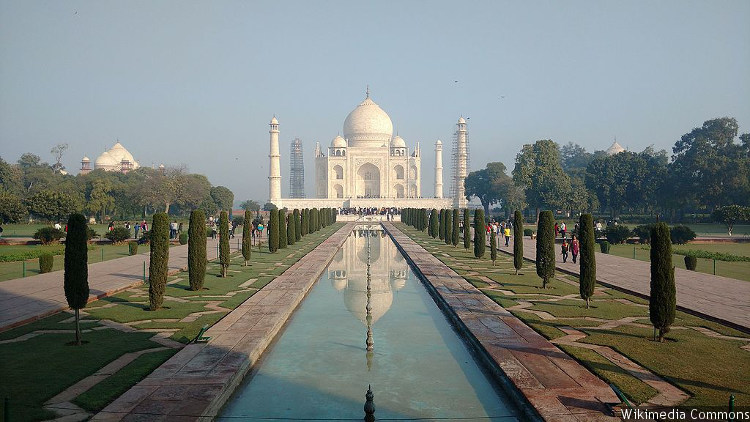Amid BJP Criticism, Mughal Monuments Are India’s Most Visited. No 1: Taj Mahal

An attack on the credentials of the 364-year-old Taj Mahal and other broadsides against the Mughals in general are not likely to change the popularity of India’s Islamic-era monuments: The marble mausoleum is the most popular choice of government-protected monuments among foreign tourists; it accounts for half of UP’s and a fifth of India’s earnings from ticket fees at such monuments; and the first six of the top 10 most popular monuments in 2014 were from the country’s Muslim past.
It did not deserve a place in India’s history because “the person who made Taj Mahal … wanted to wipe out the Hindus of Uttar Pradesh and India”, said UP Bharatiya Janata Party (BJP) legislator Sangeet Som on October 16, 2017, sparking national controversy, a fortnight after the country’s most recognised building was removed from an Uttar Pradesh government tourist brochure. Som also alleged--wrongly--that Shah Jahan, the Mughal emperor who built the Taj Mahal, had imprisoned his father.
BJP's Sangeet Som says,'Many were sad when Taj Mahal was removed from historical places.What history? Its creator wanted to wipe out Hindus' pic.twitter.com/5OcpJwC4d7
— ANI (@ANI) October 16, 2017
In reaction, Asaduddin Owaisi, All India Majlis-e-Ittehadul Muslimeen chief, asked later that day: “Can [Prime Minister Narendra] Modi and [Uttar Pradesh chief minister] Yogi [Adityanath] tell domestic and foreign tourists not to visit Taj Mahal?"
The UP government dropped the Taj Mahal, built by Shah Jahan for his wife Mumtaz in 1653, from its list of tourist attractions, the Hindu reported on October 2, 2017.
UP and India earned 49% and 21%, respectively, of their entry fees from protected monuments from the Taj Mahal alone between 2013-14 and 2015-16, according to a reply given to the Rajya Sabha (upper house of Parliament) by Mahesh Sharma, minister of state (independent charge) in the culture ministry, on August 10, 2016.
| The Taj Mahal’s Share Of Income From India’s Protected Monuments, By Entry Fee, FY2014-16 | |||||
|---|---|---|---|---|---|
| Year | India’s Entry Fee Earnings (Rs crore) | UP’s Entry Fee Earnings (Rs crore) | Taj Mahal’s Entry Fee Earnings (Rs crore) | Taj Mahal’s Earnings (As % Of UP’s Earnings) | Taj Mahal’s Earnings (As % Of India’s Earnings) |
| 2013-14 | 96.85 | 41.34 | 21.83 | 52.80% | 22.54% |
| 2014-15 | 93.38 | 42.16 | 21.24 | 50.37% | 22.74% |
| 2015-16 | 93.95 | 40.13 | 17.88 | 44.55% | 19.03% |
| Total FY 2014-16 | 284.19 | 123.62 | 60.94 | 49.29% | 21.44% |
Source: Rajya Sabha reply
About 23% of foreign travellers to India visited the Taj Mahal, the most visited protected monument in the country in 2014, according to a reply given to the Rajya Sabha by Sharma on December 2, 2015.
Source: Rajya Sabha reply
By entry fee earnings, the Taj Mahal has been the top attraction for three years ending 2015-16, earning Rs 22 crore or 22.5% of all earnings from protected monuments in 2013-14, Rs 21 crore or 23% in 2014-15 and Rs 18 crore or 19% in 2015-16.
Source: Rajya Sabha reply
Poor infrastructure has reduced the popularity of the Taj Mahal with foreign visitors, with their numbers declining 13% to 648,511 in 2014, from 743,256 in 2012, according to a reply to the Rajya Sabha by Sharma on March 16, 2016.
“The development of Taj Mahal and Agra is among the priorities of the central and state governments,” UP tourism minister Rita Bahuguna Joshi said on October 2, 2017.
“It is [Som’s] personal remark. BJP disagrees with his comment,” state BJP spokesperson Chandra Mohan said, The Indian Express reported on October 17, 2017. Another spokesperson, G V L Narasimha Rao, said the Mughal rule in India was “barbaric and a period of incomparable intolerance”.
Both the chief minister and deputy chief minister of UP have earlier alleged that the Mughal period was not part of Indian culture.
"Mughals were not our ancestors, they were actually plunderers. They looted the country. This is not our history," deputy chief minister Dinesh Sharma told Hindi news channel Aaj Tak in an interview on September 12, 2017.
"Foreign dignitaries visiting the country used to be gifted replicas of the Taj Mahal and other minarets, which did not reflect Indian culture," chief minister Adityanath said, The Telegraph reported on June 16, 2017.
(Vivek is an analyst with IndiaSpend & FactChecker.)



